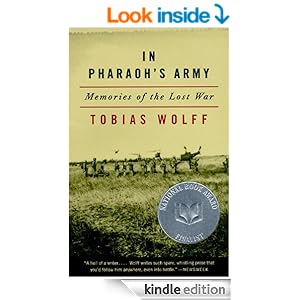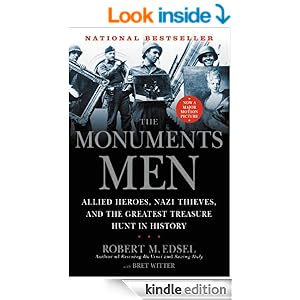Book Club ’14: Monuments Men, With the Old Breed, In Pharaoh’s Army
Three books from one of my favorite genres today, war nonfiction. Opening our eyes to the wars that have torn our past infuses more respect for the peace we enjoy and the evils we still fight.
The Monuments Men
At the same time Adolf Hitler was attempting to take over the western world, his armies were methodically seeking and hoarding the finest art treasures in Europe. The Fuehrer had begun cataloguing the art he planned to collect as well as the art he would destroy: “degenerate” works he despised.
In a race against time, behind enemy lines, often unarmed, a special force of American and British museum directors, curators, art historians, and others, called the Momuments Men, risked their lives scouring Europe to prevent the destruction of thousands of years of culture.
Focusing on the eleven-month period between D-Day and V-E Day, this fascinating account follows six Monuments Men and their impossible mission to save the world’s great art from the Nazis.
My take on it: I gave The Monuments Men two stars, as in “it’s okay.” I still want to see the movie, and there are lots of things that Edsel did really well. Probably the best thing about the writing is that this is one of those books with the potential to be very confusing because of all the characters involved. But Edsel, much more often than most authors do, consistently adds a parenthetical remark when he goes back to a particular Monuments Man to help you remember who he is.
So why two stars? I know Edsel really wants me to hate the Nazis for the historical treasures they stole and champion the men who brought them back to us, but I just can’t get over the humanity they disassembled idea by idea, life by life. Edsel briefly and sporadically nods to the real tragedies of Nazi Europe, but then, we’re right back to the art. And on the scale of worldwide destruction, I couldn’t force myself to care about the art as much as he does. Sorry. (Incidentally, I felt the same way about Hitler’s Furies– the author was trying really hard to make a point that I couldn’t feel with her.)
With the Old Breed
Now including a new introduction by Paul Fussell, With the Old Breed presents a stirring, personal account of the vitality and bravery of the Marines in the battles at Peleliu and Okinawa. Born in Mobile, Alabama in 1923 and raised on riding, hunting, fishing, and a respect for history and legendary heroes such as George Washington and Daniel Boone, Eugene Bondurant Sledge (later called “Sledgehammer” by his Marine Corps buddies) joined the Marines the year after the bombing of Pearl Harbor and from 1943 to 1946 endured the events recorded in this book. In those years, he passed, often painfully, from innocence to experience.
Sledge enlisted out of patriotism, idealism, and youthful courage, but once he landed on the beach at Peleliu, it was purely a struggle for survival. Based on the notes he kept on slips of paper tucked secretly away in his New Testament, he simply and directly recalls those long months, mincing no words and sparing no pain. The reality of battle meant unbearable heat, deafening gunfire, unimaginable brutality and cruelty, the stench of death, and, above all, constant fear. Sledge still has nightmares about “the bloody, muddy month of May on Okinawa.” But, as he also tellingly reveals, the bonds of friendship formed then will never be severed.
Sledge’s honesty and compassion for the other marines, even complete strangers, sets him apart as a memoirist of war. Read as sobering history or as high adventure, With the Old Breed is a moving chronicle of action and courage.
My take on it: Five stars; it’s a can’t-miss. Over 1400 reviews on Amazon with an average 4.9 stars, so I’m not alone in my opinion here, it seems. With all the literature and history and films I’ve seen my whole life on World War II, I could tell you an awful lot about the European theatre, but I never, ever realized or thought of what the men who fought in the Pacific went through. It’s not quite as good as Unbroken but it’s not nearly the same topic. You need to understand what our men (and women!) fought for in the Pacific theatre, and to do that, you need to read this book.
In Pharaoh’s Army
 Summary: The GoodReads version is more a review than a summary, so I’ll reprint something more informative from an Amazon review:
Summary: The GoodReads version is more a review than a summary, so I’ll reprint something more informative from an Amazon review:
In Pharaoh’s Army is not your average war memoir, nor even your average Vietnam war memoir. Wolff joined the army because he wanted to be a man of honor and he trusted the government to use its soldiers well. Instead, he finds that while he is a better soldier than some, he is not the “wily, nerveless killer” that the Army wants him to be. He gets through Officer Candidate School (at the bottom of his class) only because he has the talent to produce the satirical revue for graduation night. New assignments repeatedly have little or nothing to do with his immediate prior training. When Wolff finally gets to Vietnam, he is sent to act as the American advisor to a Vietnamese unit, but with very little guidance as to what he is to advise them about. Tet is the only pitched battle Wolff describes, but the day-to-day challenges of mines, snipers, and being a white man in an Asian world make getting to the end of each day a triumph. Each day and every trip are endless until they are over. Survival has more to do with luck than with being a good soldier. Wolff’s title is apt: “Here were pharaoh’s chariots engulfed; his horsemen confused; and all his magnificence dismayed.”
My take on it: It’s not as good as With the Old Breed, but it’s certainly worth reading, especially if you’re not familiar with the Vietnam War, as I am not. I appreciated the honesty here – there’s no Medal of Honor heroics, no massive battle descriptions, just an honest take on day-to-day life as an American soldier in Vietnam.



